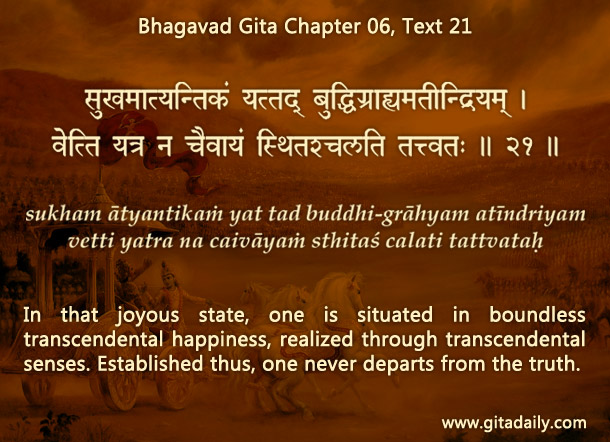Our life is often defined by an inner conflict between the ideal and the practical. If we consider the practical alone to be all-important, we will never improve and never grow ethically or spiritually. On the other hand if we consider the ideal alone to be acceptable, we will set ourselves up for self-righteousness or self-flagellation or self-deception: self-righteousness if we with great labor come up to the idea and we see others not up to that ideal and not doing much to rise to that ideal; self-flagellation if we find ourselves falling woefully short of that ideal; and self-deception if we pretend or worse still believe that we have attained that ideal just because we are able to put on a façade of having done so.
The Gita offers us a far more realistic and empowering alternative: self-acceptance and self-awareness. Rather than struggling to conform to some outer ideal, it urges us to go inwards to discover our own true self – and then to appropriately express itself through our actions.
The best way to have such a healthy self-conception is to know that we all understand that we are parts of the divine (Bhagavad-gita 15.15) and therefore have a core sanctity, independent of our current status. Knowing that Krishna loves us as we are, we can cultivate a healthy self-acceptance, wherein we can acknowledge our faults without letting ourselves be defined by them. From that self-acceptance, we can progress, through proper purificatory processes, toward self-awareness, wherein we realize and rejoice in our existential glory as blissful parts of the blissful divine (06.21).
When we connect with the divine and act in a mood of service, we all can manifest our best.
One-sentence summary:
To avoid the unhealthy attitudes of self-deception, self-flagellation and self-righteousness, we need to choose self-acceptance and self-awareness.
Think it over:
- What are unhealthy attitudes toward ourselves?
- How can the Gita help us cultivate a healthier attitude toward ourselves?
- What is your current attitude toward yourself? How can Gita wisdom help you improve it?
***
06.21: This perfection is characterized by one’s ability to see the Self by the pure mind and to relish and rejoice in the Self. In that joyous state, one is situated in boundless transcendental happiness, realized through transcendental senses.


Self awareness is the greatest quality that GITA adds to our life.